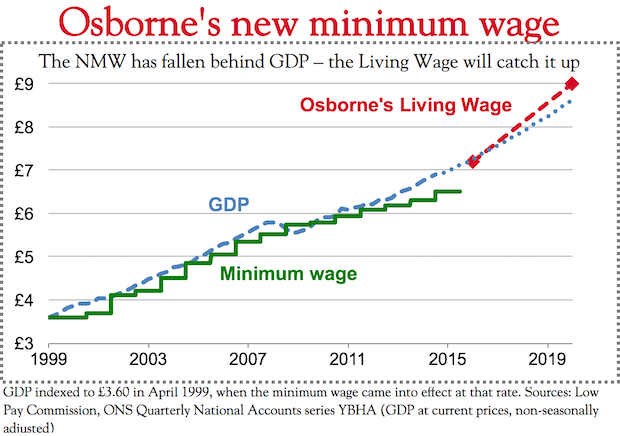During the last Labour campaign, there will be been a few moments where George Osborne will have looked at Ed Miliband proposals and thought: damn! Wish we’d come up with of that.
Take a pledge to raise the minimum wage to £8 by 2020. That was Miliband’s pledge; Osborne says £9. Doesn’t cost the government a penny. In fact, it’s better off because of lower welfare payments. So the politician gets to come across all generous, while saving about £200 million in lower welfare! Result! A higher minimum wage could be a massive (and revenue-raising) spoonful of sugar to make the medicine of tax credit reform go down.
So it’s now £9/hr by 2020 (and £7.20/hr by April next year). He has given it a different name (‘living wage’) but make no mistake: this is Ed Miliband’s policy. That doesn’t necessarily make it a bad thing. Certainly, in the chamber, Osborne admitted that it will render about 60,000 people unemployable: if your skills are not worth £9 an hour, then you’ll be on the dole. That’ll cost him an extra £300m, according to the calculation, but he’ll save £800m on tax credits.
And, the argument goes, leaving an extra 60,000 on the dole is a price worth paying for making everyone else better-off. (Not that they’d be that much better off; in many cases this will help the government more than the worker because it means more tax less in-work welfare payments).
Now, is the £9 figure so outlandish? It seems so now, but the trick (borrowed from Ed Miliband) is that £9/hour is in 2020 prices. In today’s money, it’s closer to £8/hour. Still better than the £6.50 an hour which the 4pc of workers on the minimum wage are being paid at the moment. But if you look at the history of the minimum wage (graph, above), you’ll see that it tends to rise not in line with earnings or inflation but GDP growth. And on today’s GDP forecasts, £9 is in the ball mark of where you’d expect the minimum wage to go anyway.
But it will push Britain’s minimum wage to the higher end of the international comparisons, as the OBR points out:-

The winners will be the government (more tax payble, less welfare due), workers (but not as much as you’d think). And, counter-intuitively, better-off households. Robert Peston was saying on the BBC that minimum wage increases will help those who are not typical Tory voters – i.e., the poor. Guess again.Many minimum wage employees are second earners: the OBR reckons that today’s reforms will, ironically, help the richest households the most.

The losers will be companies (sweetened by corporation tax cuts) and the tends of thousands who will soon find themselves priced out of the labour market. All told, a clever piece of low-cost politics by George Osborne – designed to discombobulate Labour and push the party further to the unelectable left.







Comments